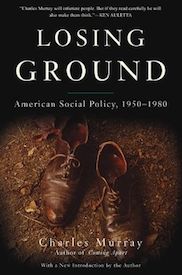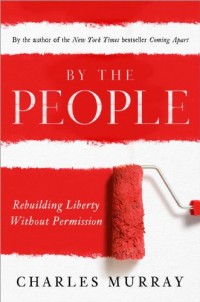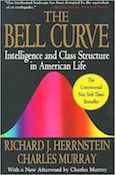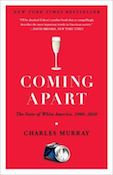Losing Ground: American Social Policy, 1950-1980
Charles Murray is probably the most misunderstood scholar in American politics. Having been smeared as a racist and an overly nostalgic square for “The Bell Curve” and “Coming Apart” respectively, what no one seems willing to acknowledge about Murray is the persistent line of concern for his fellow Americans that runs through his work. Contrary to the insistent (and wrong) accusations of racism, “The Bell Curve” was about acknowledging the role intelligence plays in stratifying society’s economic classes in order to further a sense of social responsibility among the intelligent while preventing a callous “custodial state” that cares for the poor. “Coming Apart,” meanwhile, was designed to reveal the many factors that prevent Americans from understanding or empathizing with each other, especially along class lines.
And yet, if these misunderstood works are about the gradual deadening of American empathy, then Murray’s first and arguably best work, Losing Ground, is about a different, but no less pernicious failure of American empathy: That is, the failure to reckon with whether empathy alone is enough to produce desirable policy results. Not only that, but it truly tells a timeless cautionary tale in our era of recession-style economic anxiety. It could even be said that this book should be required reading in every school social studies course, but our increasingly liberal education system will never allow it.
Murray’s thesis is as counterintuitive as it is harsh — namely, that spending more money on America’s welfare and social policy programs, actually made the condition of the poor deteriorate over time. His evidence is comprehensive and damning, and Murray relentlessly piles it on throughout the book. Fortunately, Murray’s style is not particularly dense, and he is able to offset the wonky nature of his subject matter with excellent and very accessible prose explaining each of his data points.
Structurally, Murray’s book proceeds through four distinct parts.
First, he embarks on a historical account of the ideas that motivated American social policy regarding poverty from 1950 through early 1980.
Second, he drills down to describe the actual state poor people during the eras in which these ideas were in vogue, and the catastrophic results of the policies intended to help them.
Third, he proceeds to explain why the ideas and policies were such ugly failures.
Fourth, he offers some ideas on how to reform social policy to bring it in line with its original goal of helping the most vulnerable members of society.
Some of the biggest surprises in the book come toward the beginning. For instance, Murray explains that both John F. Kennedy and Lyndon B. Johnson intended their version of the welfare state to eliminate the government handing out money to otherwise able-bodied people. In Murray’s telling, both JFK and LBJ imagined a world where every American who could work did work, and oriented their policies toward achieving that goal with ruthless determination. The description of JFK’s hard-headed approach will surprise conservatives who assume that liberals are all soft-headed sentimentalists.
Murray pinpoints an interesting failure in this policy, however, which is that while it did succeed in banishing about 89 percent of poverty that had existed prior to the Kennedy and Johnson administrations, it conspicuously failed to eliminate the problems that plagued the remaining 11 percent of those in impoverished conditions. This ended up producing an entirely different social attitude in 1965 – that government, rather than individual failings, was to blame. It was because of this, Murray charges, that social policy was turned from an attempt to cure poverty into its unconscious handmaiden.
This is not to say that Murray is completely uncharitable to those he criticizes. In his section on proposed remedies, for instance, he notes:
Hardly anyone, no matter how strictly interventionist, can watch with complete equanimity when a black child is deprived of a chance to develop his full potential for reasons that may be directly traced to a heritage of exploitation by whites. Neither can anyone, no matter how devoted to Affirmative Action, watch with complete equanimity when a white job application is turned down for a job in favor of a black who is less qualified. Something about it is fundamentally unfair — un-American — no matter how admirable the goal.
At the same time, Murray takes pains to note that the black experience became persistently less and less bearable the more “sympathy” was heaped on them by white social scientists.
Murray’s proposed solution? Return to the legal and social norms of 1965, try to make the two races compete on an even playing field as much as possible. This “return to 1965” approach is a persistent feature of Murray’s recommendations, and it surely offers reasons for discomfort among both liberals and conservatives: Liberals because it requires them to abandon their conviction that the intellectual norms of the late 60’s unambiguously favored enlightenment and cultural liberation, and conservatives because it requires them to admit the success of certain progressive policies employed by the likes of JFK.
The long and short of it, though, is that Losing Ground will inspire thought which, in our modern intellectual climate, is rare indeed. It is a must-read for everyone, but especially for conservatives, and deserves to be thought of as a classic.
Original CBC review by Mytheos Holt.
Tags: Charles Murray, Losing Ground
- The Author

Charles Murray
CHARLES MURRAY is the author of two of the most widely debated and influential social policy books in the last […] More about Charles Murray.
- Books by the Author

















